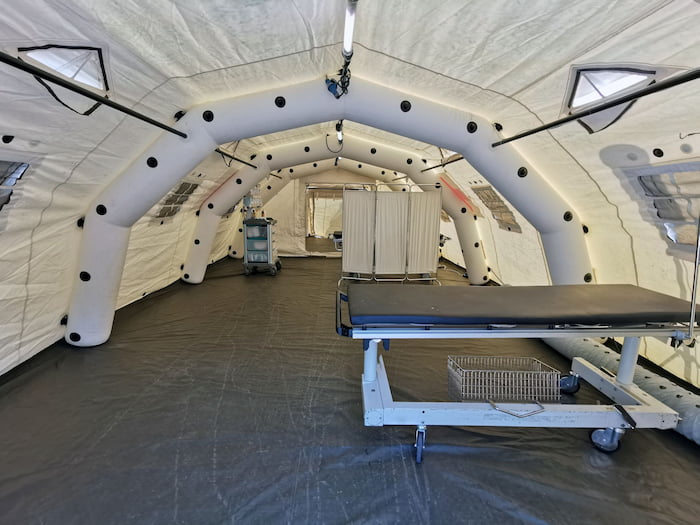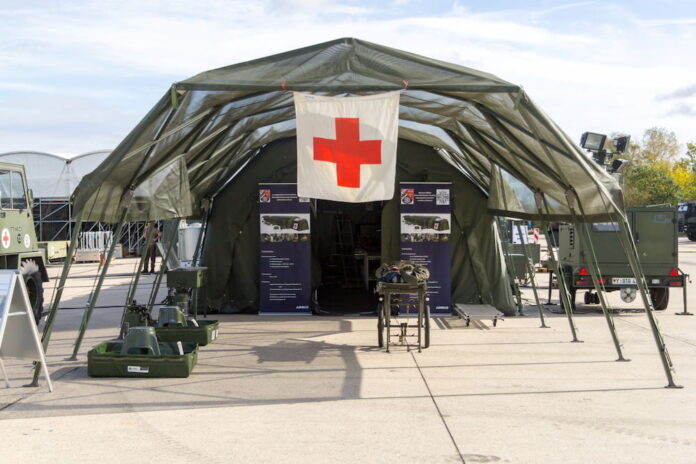Global warming and other environmental issues have recently exposed us to more frequent, violent, and highly damaging calamities.
The global Emergency Events Database (EM-DAT) recorded 432 disastrous events in 2021, a relatively higher figure than the 357 average between 2001 to 2020.
The first four months of this year were neither easy nor smooth sailing. There were violent cyclones in New Zealand, flooding in Brazil, tornadoes in the United States, and the Turkey-Syria earthquake, which claimed the lives of more than 50,000 people.
Major disasters put a heavy strain on resources, and most governments (especially in developing countries) are often unable to meet the compounding needs of their citizens. In such cases, military field hospitals are usually built to supplement, if not temporarily replace, struggling or non-functioning healthcare facilities.
Since natural disasters are inevitable, the government and private sectors must work together to adopt a proactive and flexible approach to calamity response. Field hospitals are the latest in that long line of solutions and may play a bigger role in the future.
Here’s how to prepare and set up mobile field hospitals for calamities.
1- Coordination Is Key
Host countries often need help to address large-scale disasters and would welcome any assistance. However, before setting up a mobile field hospital, it’s imperative for aid organizations, whether government or private-sector-led, to coordinate with authorities and other groups on the ground.
Organizations must likewise conduct a rapid assessment to determine the best location and offer other assistance modes to vulnerable, unserved, or underserved populations. Doing so ensures equitable healthcare access even during calamities. Studying the situation and acting according to needs allows seamless operations between and among humanitarian groups, benefitting the disaster victims.
2- Setting Up The Mobile Field Hospital
Mobile hospitals range from a few small tents to huge portable medical units within or near a disaster zone. The site must be safe from the next calamity or attack, as aid groups must put a premium on the safety and lives of their staff.
Here are some key considerations:
Choosing a location
While it’s important to be at the heart of the calamity area, you must consider factors like logistics, access to resources, security, and safety. Striking a good balance between these elements is necessary for deciding where to set up your operations.
Quick deployment
Ideally, the facility must be built within a day or two following an internal rapid assessment activity—where the medical team can identify priority healthcare needs. Field hospitals are classified based on their proximity, the number of medical staff, available medical equipment and supplies, and the services they provide.
Basic facilities required
At the minimum, mobile field hospitals must have access to a water source. Power supplies, like generators, vehicles, and telecommunications equipment, are likewise necessary. So are local volunteers, who may be medical professionals or individuals with a non-medical background.
Keeping these considerations in mind ensures the safe, efficient setup of field hospitals in crisis situations.

3- Building Your Team
The success of any healthcare facility largely depends on the medical team. Field hospitals are no exception.
Mobile field hospital staff should be skilled and experienced enough to work in high-pressure and challenging situations. Disaster victims undergo severe mental and physical trauma, and healthcare workers need special training to handle and interact with them efficiently.
Nurses must be skilled at triaging or identifying patients with urgent healthcare needs. In addition, employing reliable local staff may be necessary to work around communication and cultural gaps.
4- Equipping The Field Hospital
In most cases, field hospitals become the first point of contact for the sick and injured. Basic medical and pharmaceutical items must be available, including devices for taking and monitoring vital signs.
Equipment needs will depend on the procedures your facility is authorized to perform, including pain and wound management, minor or major surgeries, etc.
Regardless of the types of health care services to be performed, field hospitals must include a shelter for the staff and at least one each for patients’ isolation, waiting, and recovery areas. Such spaces ensure that patients don’t get worse while waiting for their turn or that they can recuperate from injuries and trauma as soon as possible.
5- Ensure Mobility, Safety, And Communication
Proper access to logistics and communication are at the front and center of every mobile field hospital operation.
Such a facility must have easy and swift access to supplies, personnel, and patients to ensure smooth operations. Any obstacle to mobility can hamper their operations and deprive patients of life-saving services.
Similarly, with communication, the mobile field team can perform basic operations and arrange supply pick-ups, patient transfers, or medical evacuations. These are priority factors when choosing the right field hospital location.
Personnel safety is also paramount in any disaster response. Besides ensuring that the field hospital is located outside hazardous areas, deploying security personnel nearby is best, especially in conflict zones.
The New Nexus Of Crisis Care
Disaster response must be quick yet tailored based on the priority needs of the affected population. The practices discussed above can be implemented to improve responses during emergencies without compromising the response team’s safety and security.
As such, mobile field hospitals must be versatile to meet the rapid changes in the field. A highly flexible yet scalable response can easily be set up and expanded as you improve your hospital operations internally, addressing the medical needs of disaster victims more efficiently.
Read Also
- Modern Approaches to Adolescent Mental Health Treatment for Lasting RecoveryWith increasing numbers of teens experiencing emotional and behavioral health concerns, adolescent mental health treatment has become more essential than ever. Conditions such as anxiety, depression, trauma and mood instability are on the rise, and effective support must evolve with these growing needs. Today’s treatment models blend evidence-based therapy with flexible access and holistic care, giving… Read more: Modern Approaches to Adolescent Mental Health Treatment for Lasting Recovery
- How to Drive Growth Through Customer Centricity in HealthcareThe world of healthcare is changing in big ways. Consumers are now stepping up and taking charge of their health journeys. This change is happening now for important reasons. The U.S. health and wellness market is huge, projected to be over $6 trillion in 2025. This growth is fueled by rising out-of-pocket costs and more… Read more: How to Drive Growth Through Customer Centricity in Healthcare
- Why Biotech Companies Choose Contract Manufacturing Organizations for Scalable GrowthBiotech and pharmaceutical companies are under constant pressure to innovate, scale fast, and stay compliant. Doing everything in-house can slow them down. That’s why many are turning to a contract manufacturing organization to handle specialized production needs—especially in genetic and molecular biology fields. Reliable CMOs offer speed, precision, and regulatory knowledge. For early-stage firms, this… Read more: Why Biotech Companies Choose Contract Manufacturing Organizations for Scalable Growth
- Maximizing Digital Reach for Podiatry Clinics in Local HealthcareMaximizing Digital Reach for Podiatry Clinics in Local Healthcare As the healthcare industry evolves, mobile marketing becomes indispensable for practitioners. Podiatry clinics, focusing on foot and ankle care, must adapt to digital strategies to engage patients effectively. Implementing tailored SEO practices is crucial for these clinics to thrive in an increasingly competitive market. Digital marketing… Read more: Maximizing Digital Reach for Podiatry Clinics in Local Healthcare
- How to Find a 5-Star Dentist Near YouChoosing a dentist is more than just finding someone who can clean your teeth. It’s about selecting a trusted partner in your long-term oral health. A 5-star dentist not only provides excellent clinical care but also delivers a positive patient experience, from the moment you walk in until the moment you leave. Whether you’re new… Read more: How to Find a 5-Star Dentist Near You
- Leveraging Virtual Medical Assistants to Maximize Operational Efficiency in HealthcareIn the increasingly complex and fast-paced world of healthcare, operational efficiency is critical. Doctors and healthcare administrators are faced with numerous challenges, from managing patient scheduling and medical billing to adhering to stringent regulatory compliance and insurance claims processing. These tasks, while essential, often divert time and resources away from the core mission of providing… Read more: Leveraging Virtual Medical Assistants to Maximize Operational Efficiency in Healthcare







